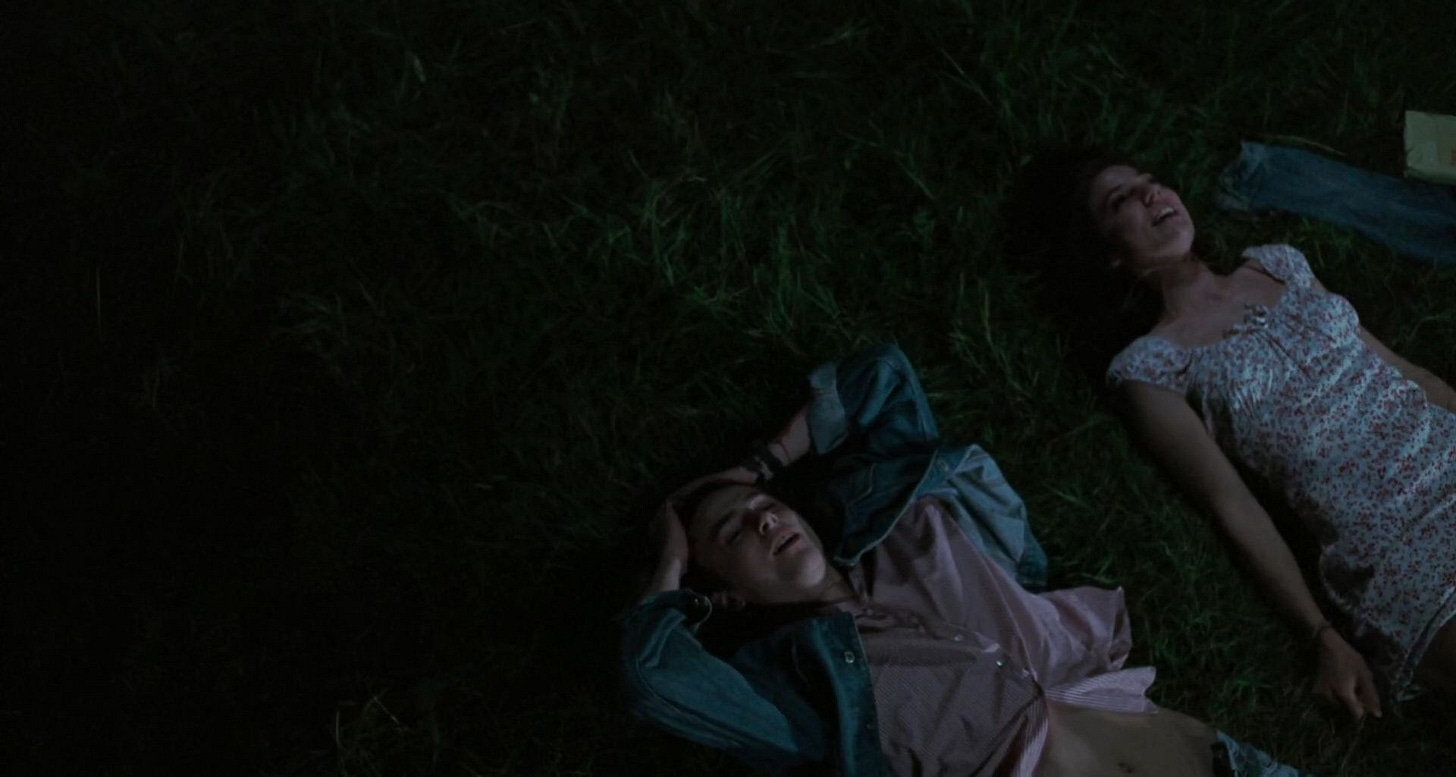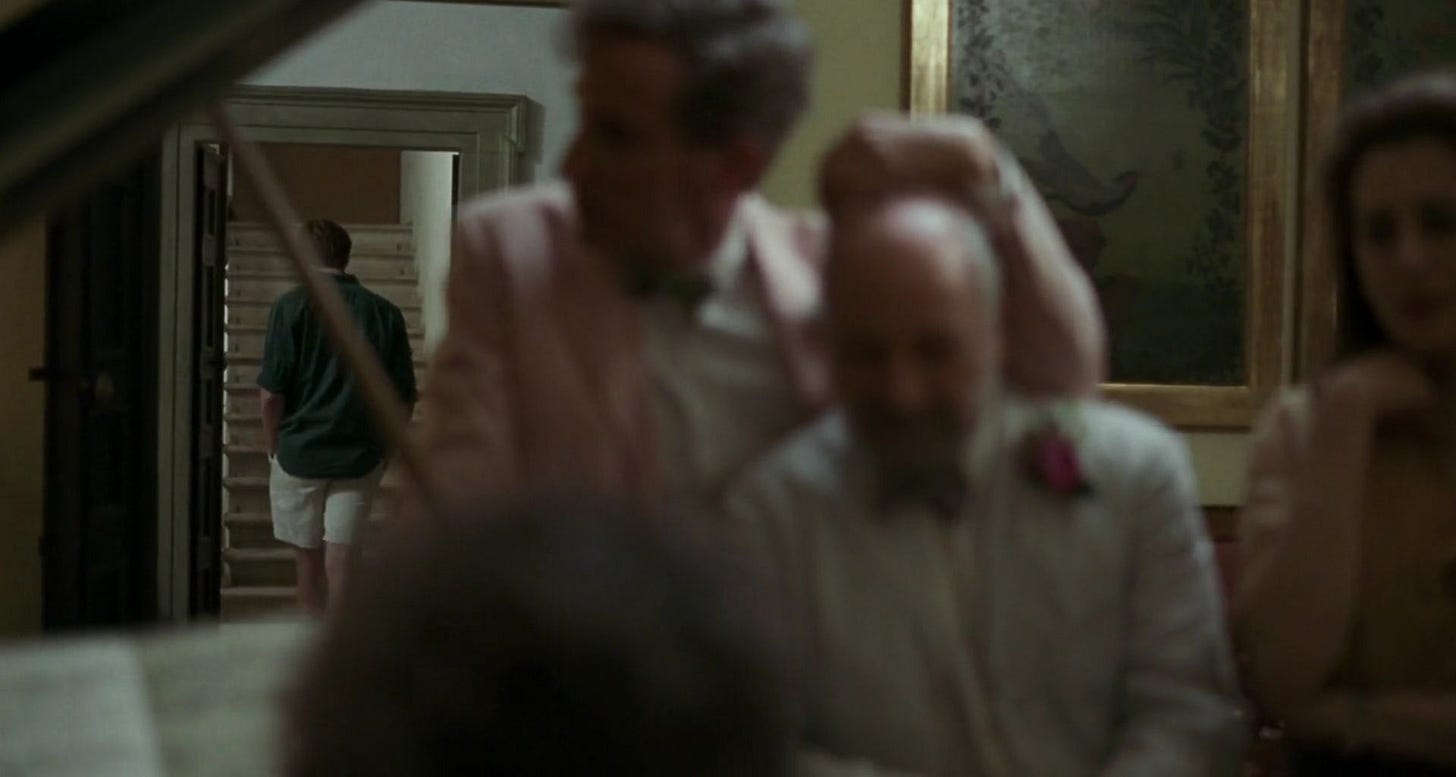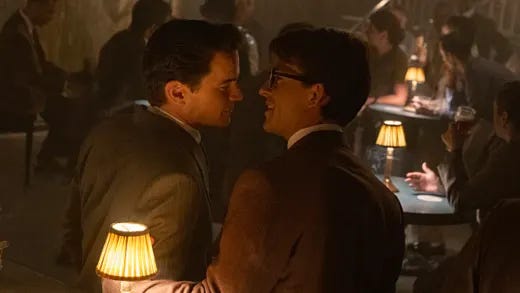Content warning for discussions of predatory + underage relationships, period-typical homophobia, and peach-related sexual content. Spoilers ahead.
Almost six years after its original release in American theatres, it is safe to say that Call Me By Your Name by director Luca Guadagnino, for better or for worse, has become the Internet’s defining queer movie of the 2010s. (Sorry, Moonlight.) Timothee Chalamet earned an Academy Award nomination for Best Actor in a Leading Role at the tender age of twenty-two for his performance in it. Lil Nas X referenced it. People, in the year of our Lord, are still making memes on Twitter about it. You cannot escape the chokehold that this movie holds on pop culture discourse to this day, even if you tried.

Yet, despite the film’s cultural relevance as a piece of mainstream queer media, everyone in my life who has watched this movie is straight, and when I ask my queer friends about their opinions on Call Me By Your Name, they often react strongly with disgust over its “problematic” elements, or shame for wanting to consume the piece of media anyway. One of them explicitly mentioned that he felt like he would be heavily scrutinised by others in his circle if he ever expressed a desire to watch Call Me By Your Name around them; he even thanked me for “breaking the stigma” around such an infamous subject …which is, ignoring all the controversies surrounding it, literally just a movie.
So, what’s the deal with Call Me By Your Name? Could this movie be considered “problematic”, and if so, why do we care? Most of all, should we even be making such a big fuss about “problematic” media, in the first place?
Cancel Culture, (Briefly) Explained
Though “cancelling” pieces of “problematic” media is a relatively new phenomenon, Dr. Maura Edmond argues that the concept of ethically examining our consumption habits has existed for as long as the word “consumer” has existed, with most theories on ethical consumption traditionally having to do with industries where consumers can directly purchase goods from corporations1—practices that this article will refer to as “physical ethical consumption”.
The queer community, in particular, has a storied history of leading boycotts against consumer goods companies, one of the more documented examples being the orange juice boycott led by queer activist groups against raging homophobe and Florida Citrus spokesperson Anita Bryant from 1977 to 1981. By refusing to drink orange juice, consumers—queer or otherwise—across the United States could quietly demonstrate their solidarity, even when queer people in that era often had no alternatives for protest without inadvertently outing themselves. While Bryant's eventual decommission from the board was mostly caused by her deteriorating marriage, not the boycott itself, Bryant's public platform helped rally disparate groups of queer people against a singular enemy, essentially acting as kindling to fuel the growing gay liberation movement. In today’s world, an example of “physical ethical consumption” might consist of consumers refusing to purchase from fast fashion brands, like Shein or H&M, because of their infamously horrific labour practices and the colossal amount of waste generated from overproducing cheap articles of clothing.
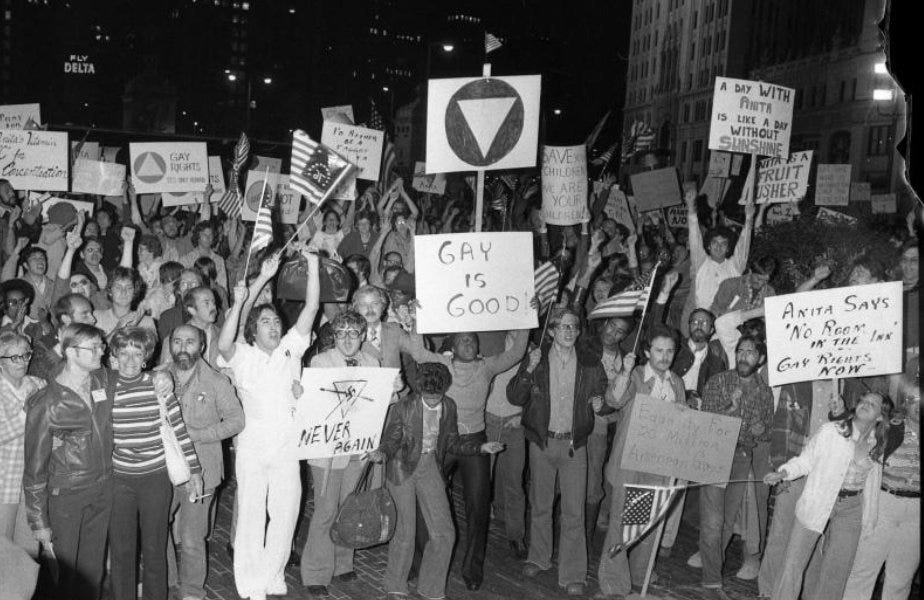
According to Dr. Edmond, the earliest forms of media protesting—what we would now deem as “cancel culture”—were Christian lobbyists boycotting the Disney multi-media conglomerate in the 70s and 80s over their supposed “concerns about the declining standard of family values represented in the company’s film and television titles” (ie. depicting violence, sex, and marginalised communities on-screen); however, with the rise of progressive activist campaigns like the #MeToo movement in 2015, media boycotting has become more commonly associated with communities that would probably align themselves with the anti-Bryant queer activists, rather than the conservatives of that same era—most of which would, funnily enough, probably support Bryant’s message of “thinking about the children”.
In her paper “DRAG THEM: A brief etymology of so-called ‘cancel culture’”, Dr. Meredith D. Clark defines cancelling as “an expression of agency, a choice to withdraw one’s attention from someone or something whose values, (in)action, or speech are so offensive, one no longer wishes to grace them with their presence, time, and money”.2
While most left-wing individuals claim to not engage in the mainstream definition of “cancel culture”, which is used by media outlets across the political spectrum to refer to cases of online harassment and mob-mentality, a vast majority of us engage in Dr. Clark’s definition of cancelling when it comes to emotionally and politically detaching ourselves from pieces of media that we once loved. Marginalised people, especially, are more prone to ethically examining the media they profess to love to others in order to elicit the “right” kind of reaction from their peers due to how society often criticises their actions far more than their non-marginalized counterparts. This heightened media awareness helps to contextualise why my queer friends, for instance, have a stronger sense of disgust towards Call Me By Your Name than my straight friends, who tend to care less about whether the piece of media that they are consuming is “problematic” or not.
Disengaging with a beloved piece of “problematic” media can be incredibly difficult for the consumer, especially if they once held the work in high emotional or nostalgic regard—just ask anybody who had to reexamine their life-long Harry Potter obsession after J.K. Rowling decided to use her multi-million dollar platform to peddle transphobic rhetoric—but Dr. Edmond notes in her research that often, the sheer amount of guilt and shame that people feel before, during, and after consuming a piece of “problematic” media far outweighs their former love of it. “Even [with] some of the stuff that I’ve consumed before,” one individual in Dr. Edmond’s participant pool admits, “the fact that we’ve contributed in a way to them being [popular] [...] [makes] me uncomfortable.”
To combat the unease, people often turn to media abstinence, unfollowing creators on social media, removing their works from playlists and watch lists, and refraining from consuming any new pieces of media that they are involved in. Others, not knowing how to quit a particular creator or piece of media3, might stop financially supporting them but will still express a (shameful) love of their “problematic fave”, while prefacing their sentiment with a comment that yes, they know how “problematic” it is, but they just really like it and you should give it a chance if you can look past the “problematic” elements, okay??
Is Call Me By Your Name Problematic?
In my experience, people tend to label a piece of media as “problematic” for two reasons:
Someone(s) involved in the media’s creation has either expressed controversial viewpoints or committed moral transgressions.
The story itself contains transgressive elements that are deemed too offensive for consumption.
Dr. Edmond states that “our evaluation of good work (good, in this case, meaning “morally sound”) is intractably bound up with our evaluations of good people” and I agree with her, on that front: in light of …everything that has happened with Armand Hammer (and, to a somewhat less egregious extent, Timothee Chalamet4), Call Me By Your Name (2017) can undeniably be considered as a piece of “problematic” media based on the first of the two statements listed above. Not wanting to watch Call Me By Your Name because of both actors’ misconduct is completely valid.
…That is all I am going to say about that, since despite being forced against my will to know more details about their lives than I had ever previously thought possible just on account of cursorily following celebrity news online, I am not dipping a single toe in the bottomless, murky depths of Armie Hammer or Timothee Chalamet discourse. If you have somehow remained in ignorant bliss for the past four-or-so years, you can Google it yourself. For the sake of my own sanity, we are ignoring whatever the Hell is going on with those two and moving right along.
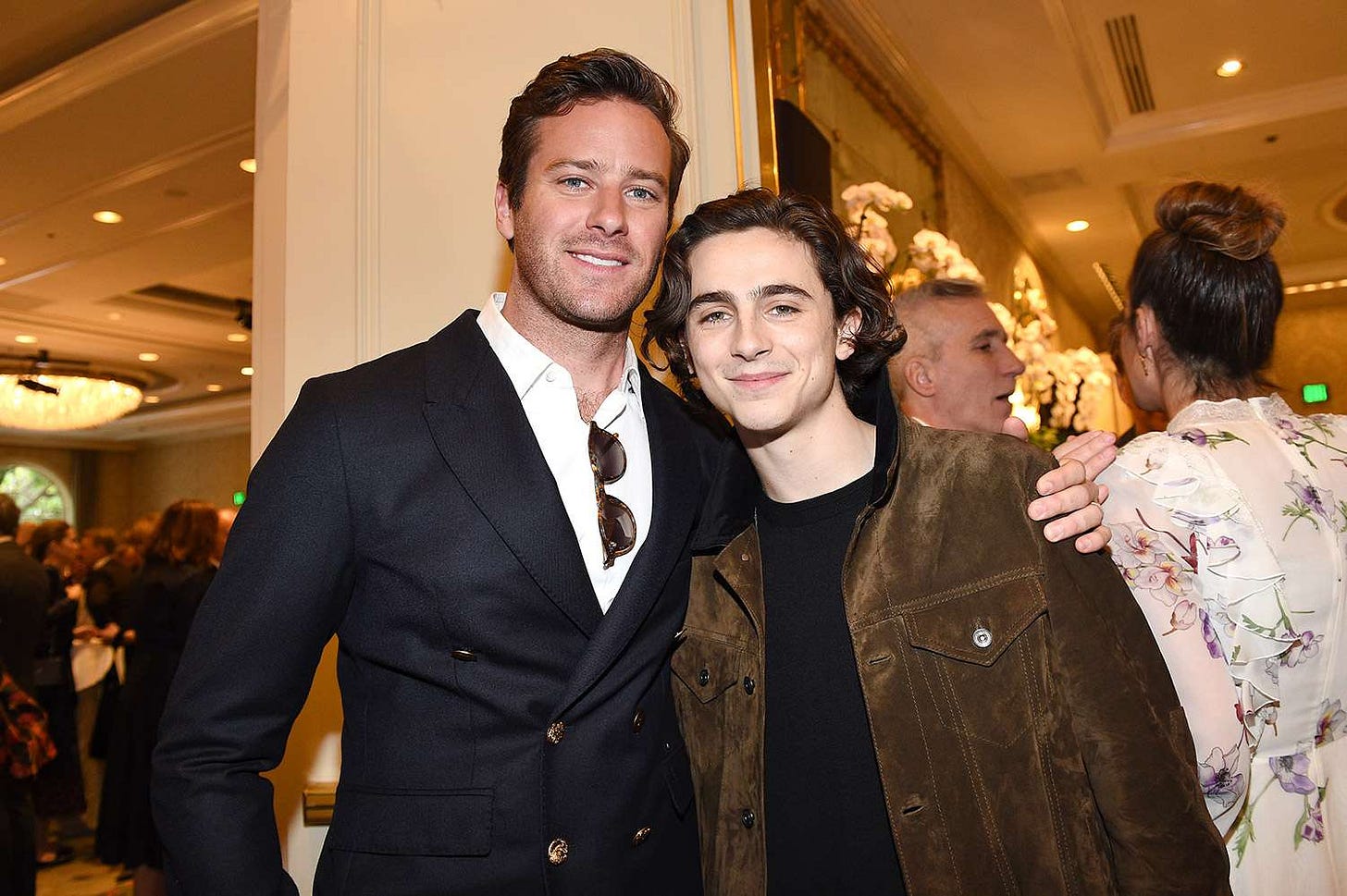
I believe that Call Me By Your Name (2017) can also be considered as a piece of “problematic” media according to the second statement, though the reasoning behind that requires a bit more context. For those of us that are unaware, the Wikipedia synopsis for Call Me By Your Name states that “[the movie] chronicles the romantic relationship between a seventeen-year-old, Elio Perlman (Chalamet), and Oliver (Hammer), a twenty-four-year-old graduate-student assistant to Elio’s father Samuel, an archaeology professor”. In the span of six weeks, the characters, fueled by red-hot desire and the heat of the Italian sun, trade flirtatious jabs and eventually sleep together, only for Oliver to leave the Perlmans (and marry his on-again, off-again fiance) at the end of his summer internship.

Already, some alarm bells might be ringing in our heads—a romantic relationship between a seventeen-year-old and a twenty-four-year-old presents not only a questionable age gap, but also raises concerns about grooming and predatory relationships. Interestingly enough, I have seen arguments that both Elio and Oliver serve as the “seducer” in their dynamic, with some arguing that Oliver preys on Elio’s boyish innocence and others arguing that Elio serves as a reverse of the “temptress archetype” common throughout early 1900s media, using his so-called “feminine guiles” to lead Oliver off of his moral path. (If held at gunpoint, I am more inclined to agree with the sentiment that Oliver exhibits predatory behaviour towards Elio over the latter claim, my qualms with people calling a seventeen-year-old a “seducer” notwithstanding.) It also does not help that Chalamet, despite only being ten years younger than Hammer, looks to have barely graduated high school, whereas Hammer looks old enough to have sired multiple children. In a movie that revolves around aesthetics, it is little wonder that the actors’ appearances matter much more to a viewer than their (or their characters’) real ages.5

On the topic of minors acting in ways I do not approve of, Elio smokes a lot of cigarettes in this film, which, while accurate to the movie’s setting—I have never met a European who did not smoke at least once in their rebellious teenage years—and to Elio’s character as a whole, did offend my North American sensibilities. I think that a more insidious reason, however, as to why I rarely see criticisms of Elio’s smoking in discussions of Call Me By Your Name’s glorification of “problematic” underage behaviour is that smoking, in general, has already been glorified to (literal) death in our media due to tobacco companies peddling incredible amounts of pro-smoking propaganda to every single marketable group possible in the last hundred years6, including to liberated queer youth7. To return to the idea of a work’s “problematic” image being oftentimes more important than its “problematic” substance, as an audience, we are much more willing to overlook a film’s potentially dangerous messages if we are predisposed to view them as normal, even attractive.

Though I have mentioned many criticisms of Call Me By Your Name’s “problematic” elements (as it relates to its actors and story, anyway), I will not be commenting on the validity of these claims; however, in later sections of this article, I will be countering arguments regarding Call Me By Your Name’s supposed endorsement of its “problematic” elements, so make of that what you will. I do blatantly dislike the prevalence of smoking throughout this movie, though—I might find it hot, but I must first speak my truth!
Call Me By Your Name is Problematic—Now What?

“So. Your fave is now considered ‘problematic’.”
For the purposes of this argument, I am going to operate under the basis that:
Call Me By Your Name contains “problematic” elements,
said “problematic” elements are inexcusable,
any piece of media that contains “problematic” elements becomes, in and of itself, “problematic”.
As you could have probably guessed by now, over the past few years, how we ethically consume “problematic” media has been a subject of much debate. How far must we go to detach ourselves from a piece of “problematic” media? Do we, as consumers, hold any responsibility towards the ethics of whatever piece of media we are consuming? Is it simply enough to recognise that a piece of beloved media is “problematic”, or do we have to denounce it, too?
Allow me, if you will, to answer a question with another question: if you consume a “problematic” piece of media and nobody is around to witness you doing so, did you ever even consume the “problematic” piece of media? In other words, if nobody was aware of the fact that you, at some point in the past, have consumed—and maybe even liked!—a piece of “problematic” media, what impact did your “problematic” media consumption have on the people around you? Nay, the world?
Sure, it is true that consuming media in this capitalistic society usually refers to financially supporting the creators who made it, but there are a plethora of methods—legal or otherwise—to consume media in the digital age without spending a single cent. If, say, the hypothetical subject of this thought experiment watched Call Me By Your Name (2017) on a pirating website and borrowed the book from his local library8, what harm did his actions actually cause? …Besides subjecting you all to this article, that is.
My point is that the act of consumption is a neutral act. We watch. We listen. We read. There is nothing inherently wrong with watching, listening, and/or reading.
Yes, we should deplatform creators that have enough clout to ruin millions of already-vulnerable lives with a single social media post; yes, we should disengage with media that ultimately degrades, rather than uplifts, marginalised communities—but if someone has a poster from a “problematic” media franchise tacked onto their wall or has given a “problematic” movie five stars on Letterboxd, who does that negatively affect? Or are we simply using our carefully-curated, “unproblematic” media tastes as yet another way to virtue-signal online?
In “is tiktok ruining reading? & the desire to be ‘a reader’”, Leonie Christel of YouTube channel The Book Leo mentions how on the Internet, the type of media that you are consuming—or, crucially, show to others that you are consuming—can either elevate or demote your social status; for example, instead of posing with a Maserati or curating a feed that consists solely of aesthetic brunch selfies, a politically-savvy influencer might post their bookshelf with R.F. Kuang’s popular 2023 title Yellowface as its centrepiece, or publicly condemn controversial figures like Kanye West, in order to stealthily broadcast their #wokeness to their followers. Essentially, this kind of thinking boils down to, “if I consume X media that the people around me deem as ‘socially acceptable’, people will assume that I am ‘cool’ and ‘intellectual’; consequently, if I consume Y media that the people around me deem as ‘problematic’, I will then be seen as ‘problematic’ by association”.
Curiously, she also claims that countercultural phenomena, such as the recent BookTok trend of people hating on Colleen Hoover’s publications, also stem from people wanting to be perceived in a positive light by others; while many creators offered good-faith criticism of her novels, others were “very eager to announce to the world that [they] did not like Colleen Hoover” in order to prove to others that they had “better taste” than those who might have liked her books.
“Cancelling” media might be more akin to the latter than the former, but either way, both kinds of performative tendencies indicate that we collectively have begun to treat pieces of media less as art and more as political signifiers online, which, while I understand that “the personal is political” and that art has always been used as socioeconomic symbols, is arguably not what the second-wave feminists intended that particular phrase to represent. By turning certain pieces of media into points of contention, we have rendered ourselves almost incapable of analysing media without needing some kind of preface that asserts to our audiences how politically correct we are, myself included. So, having now gotten all of that out of the way, it is high time to properly delve into Call Me By Your Name, “problematic” elements and all.
“It Was Real to Me”
“I got these beliefs that I think you wanna break / got something here to lose that I think you wanna take from me,” begins Troye Sivan’s “Seventeen”, the opening song to his sophomore album, Bloom.
After the song’s release, the YouTuber-turned-musician revealed in a now-deleted interview with Attitude Magazine that the song’s inspiration came from his experiences hooking up with older men on Grindr as a teenager discovering his sexuality. “I managed to get a fake ID and then I got Grindr on my phone and started to try to meet people who were like me,” Sivan says, “but you sort of are forced a little bit into these hyper-sexualised environments, and even though that’s awesome when you’re [seventeen]… I didn’t know what else to do.”
In the aforementioned interview, Sivan alludes to an universal facet of adolescence—at the tender age of seventeen, for the first time in our lives, we want everything. Having only recently been released from the gated sanctuary of childhood, but not yet shackled by adult responsibilities and routine, we want to discover everything, to conquer everything, to hold everything in our hands and then gorge ourselves on its totality with reckless abandon.

Sometimes, that feverish lust—for sex, for life, for the amorphous everything—compels teenagers to rush headfirst into danger, like seventeen-year-old Sivan losing his virginity to an older man on Grindr; I, for one, know a couple of girls who have had entanglements (sexual or otherwise) with college students during their high school years. To complicate matters, queer male youth in particular have a tendency to turn to unsafe methods, such as using social networking apps to anonymously hook up with adult men, to explore their sexualities out of fear of rejection; a 2018 study by Macapagal et al. suggested that 53% of their American adolescent participants are on an adult dating site and that out of the 62% who have anal sex, only 25% of them claim to have always used condoms during these encounters.9 These statistics, along with the various anecdotes that I have heard through the confidential grapevine throughout the years, prove that risky—even predatory—relationships between teenagers and adults are a pervasive issue, and this article is not meant to mitigate that in the slightest; however, does the prevalence of “problematic” behaviour in today’s society mean that we should not portray said behaviour in the media at all? And should we really be blaming teenagers for ignoring the potentially hazardous consequences of their actions instead of blaming the adults for allowing these toxic relationships to develop in the first place?
I often hear people talk about how Call Me By Your Name romanticises age gaps by idealising Elio and Oliver’s relationship, which is an argument that fundamentally misunderstands the themes presented in the movie—if anyone is romanticising their relationship, Elio is the one doing so. As Lola Sebastian points out in “we need to talk about Call Me By Your Name”, Call Me By Your Name (2017) depicts Elio’s unreliable, biassed interpretation of the events that took place that fateful summer, through a lens that has been (sometimes literally) blurred by his memory. The final scene of the film is Elio weeping for three minutes straight as he replays the events of the last six weeks over, and over, and over again in his mind, set to Sufjan Stevens’s “Visions of Gideon”. Referring to computer tape company Memorex’s commercials that would ask the question, “Is it live or is it Memorex?”, Stevens asks, “Is it a video?”, meaning, “Did any of the events in Call Me By Your Name really take place, or are they mere figments of Elio’s glamorised imagination, captured in a two-hour-long film reel?”
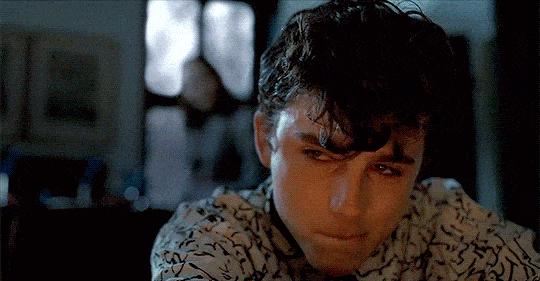
My favourite moment in the entire film—and Guadagnino’s, too, if that helps—is when, during a quiet scene in which Elio pines for Oliver in the courtyard at dusk, the picture flashes different exposures, quietly reminding the audience that oh, right, we are watching a movie. Combined with “Futile Devices (Doveman Remix)” by Sufjan Stevens (again) playing in the background, the effect manages to weave together the ephemeral quality of Elio’s love for Oliver with, to quote the director himself, “the miracle of cinema”. Although unplanned on Guadagnino’s part, since the exposure-flipping was due to a mistake by the film lab, this shot perfectly answers Stevens’s question in “Visions of Gideon”—it is a video; thus, we should not be taking any of the events in Call Me By Your Name at face value.

The theme of memory is only made more obvious when examining the original novel, which is recounted entirely from an older Elio’s point of view. After that blissful summer, the adult Elio freezes the memory of Oliver in his idealised version of the past; when the two live concurrently in New England decades later, he trades the possibility of seeing Oliver—now with wife and children—in the flesh for the spectral image of his “pluperfect lover”, as not to feel the weight of losing his first love crashing down on him. Call Me By Your Name (2017)’s Elio does not have the luxury of reminiscing upon his experiences from a distance, hence the crying; to borrow Anthony Lane’s wine metaphor from his New Yorker review, if the book is Elio indulging in a “mature and thoughtful vintage”, in the movie, he is only just starting to let the grapes ferment.
Despite its picturesque visuals, Call Me By Your Name (2017) also cannot be described as a traditional romance; rather, as Guadagnino once described, it depicts foremost the “mature coming-of-age” of Italian-American teenager Elio Perlman—no longer a boy, not quite a man—as he grapples with his burgeoning desires towards Oliver, yes, but also Marzia, the same-age confidante that he ultimately loses his virginity to. When Elio and Marzia become intimate for the first time, instead of passionately falling into each others’ arms in a luxurious bed, they tumble together on the grass, Elio’s body covering Marzia’s completely in the dim corner of the frame; Elio asking Marzia if it “feels good to her” is almost drowned out by the droning cicadas. Similarly, though Elio tries to appear unaffected by Oliver’s aggressively self-assured mannerisms, even defiantly making the first move by placing his hand on Oliver’s crotch, the film makes a point of lingering on the two of them on the balcony, Oliver stroking Elio’s wrist as he wordlessly eases Elio’s fears before they finally have sex. “I’m nervous,” Elio admits outright. Would a film that romanticises a teenager’s budding relationships portray them with such, for lack of a better term, unadulterated social awkwardness? I doubt it.
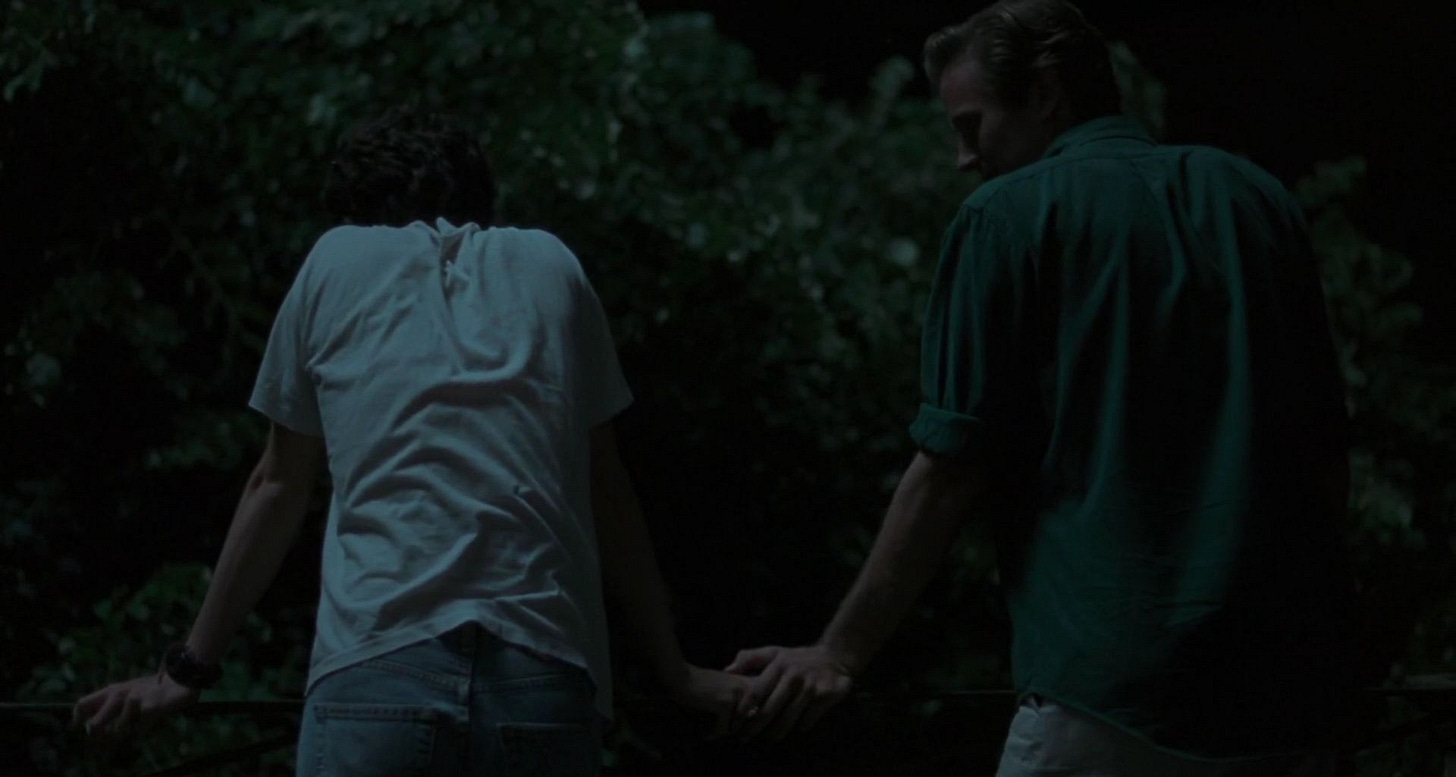
Why bring any of this up? Call Me By Your Name (2017) seeks solely to depict one teenager’s first love and queer awakening as authentically as possible—including the good, the bad, and the occasionally ugly “problematic”. It does not seek to condone any of said teenager's actions, only to display them on the silver screen without casting any judgement on them; in fact, by comparing Elio’s love of Oliver to Gideon’s devotion to God in the Book of Judges in the aforementioned “Visions of Gideon”, the film makes a strong argument that Oliver, like the God that appeared so frequently in his apostle’s dreams, ultimately had to leave Elio once his work—in this case, to guide his young lover on his journey towards discovering his sexuality—was completed10.
Troye Sivan once said in a PopBuzz interview in regards to “Seventeen”:
I’ve rehearsed the backlash and the response a million times in my head. I’m worried because I don’t want to ever come across that I’m condoning that or anything like it. But I felt, greater than all of those worries, a responsibility to tell that true story—of the curious gay kid who puts himself in some kind of shady situation to find a connection, like all of us crave.
Like Sivan, like the ladies who have told me stories about hooking up with older men when they were underage, Hell, like Kevin—the person who asked Guadagnino about the meaning behind the exposure-flipping shot in the NYFF Q&A—who shared his experiences of being a queer fifteen-year-old in 1983 and having two similarly life-changing relationships with older graduate students later in the 80s, Call Me By Your Name, which derives all its emotional power from Elio’s singular point of view, never once claims to represent what anyone’s teenage years should be, only what its protagonist’s teenage years were. “Maybe a little too young / but it was real to me”, Sivan sings; sometimes, the responsibility to share your truest lived experiences, ”problematic” elements and all, through the media you create in the hopes that someone, out in the unconquerable universe, feels heard by them—it far outweighs everything else.
Shame and Release
Thus far, I have discussed, among other things, the history behind cancelling “problematic” media, the various claims that Call Me By Your Name (2017) contains “problematic” elements, and the valid reasons why creators might choose to include “problematic” elements in their works; however, I have not mentioned anything about what we, as conscientious consumers, should do about the nagging guilt that we feel after engaging with “problematic” media, or whether or not that uneasiness is deserved. I have also been tiptoeing around arguably the most controversial topic in the entire movie, and the other reason why people tend to be opposed to watching it—a scene that is so important that Luca Guadagnino, famed hater of fanservice, felt that it was necessary to include in the film adaptation. In order to tackle these seemingly disparate subjects head-on, I will stall no longer: we must finally talk about Call Me By Your Name’s infamous peach scene.
So as to not incur the wrath of my school administration, who have certain guidelines about what I can and cannot include in a public article, I will try to describe what happens as chastely as possible. Ahem.
The afternoon after he and Oliver have sex for the first time (without discussing their feelings afterward, of course), Elio, pent-up in more ways than one, grabs a peach off of his bedside drawer, inspects it under the sunlight, and ejaculates into it. Oliver then walks into the room and pokes fun at his lover—”You’ve moved on to the plant kingdom already, what’s next, minerals?”—before motioning to bite into the peach. Elio wrestles with Oliver to stop him from eating it, then bursts into great, frame-wracking sobs.
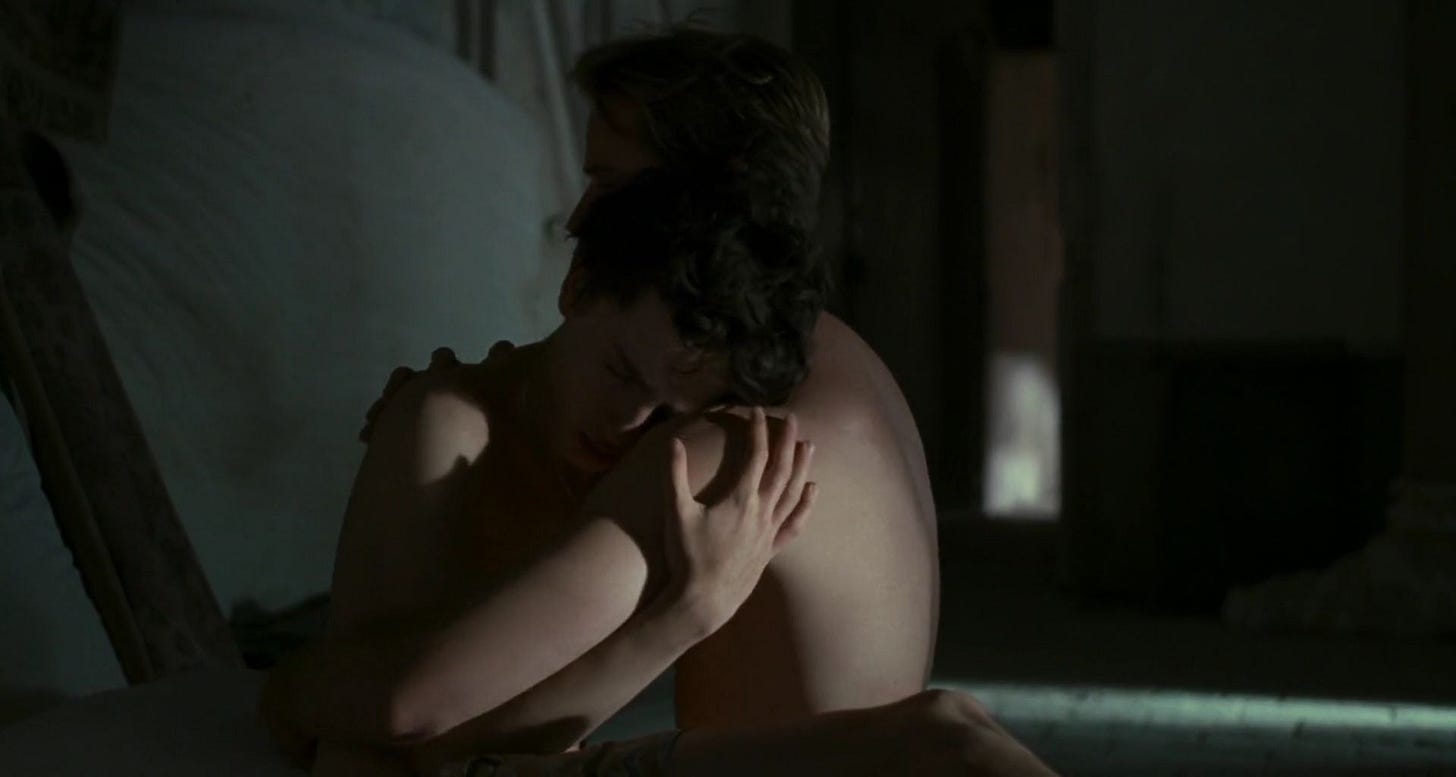
Now, we should probably back up a little bit and, to paraphrase Natalie Wynn, place the text in its original context. Prior to this moment—which occurs a whopping hour and a half into the movie—Elio (and to a lesser extent, Oliver) has been shown to be grappling with a sort of internalised homophobia. In Elio’s case, these insecurities are most obvious in the scene right before Elio and Oliver have sex where the Perlmans invite Isaac and Mounir, two flagrantly gay academics, to their villa for dinner; although Elio seems to get along great with them during the dinner itself, he refuses to wear the “tacky” shirt that they gifted him at first and privately dismisses them as “Sonny and Cher”. The novel takes one step further in depicting Elio’s shame, with the voice of his grandfather echoing in the back of his head before he steps into Oliver’s room to consummate their relationship, warning him to turn back before he could experience “the pall of despair when disenchantment has all but shamed every ill-stretched nerve in [his] body” (126)11. So, despite being raised in an incredibly progressive household for 1983 standards—Mr. Perlman even reprimands Elio outright when he mocks Isaac and Mounir, admonishing that he is “too old to not accept people for who they are”—Elio, at the very least, has some unprocessed hang-ups over being queer, which could only worsen once he and Oliver have consummated their relationship.

Lo and behold, this is where the peach scene comes into play. As Elio admits himself, performing sexual intercourse with a fruit is, objectively, the most “sick and twisted” act that any character commits in the entire movie; therefore, due to its perverted nature, the peach serves as a symbol of Elio discharging (ha) all the nasty feelings that he has thus far suppressed over the pass six weeks—shame, guilt, fear of rejection by an older, more experienced man—into a singular object. When Oliver then finds the peach fascinatingly erotic instead of depraved, saying that he “wishes everyone was as sick as [him]”, Elio’s defensive hackles begin to rise, causing him to bat away at Oliver’s hand when he tries to put the peach into his mouth. Even after they have already stripped each other bare, in a painfully adolescent move, Elio still tries to put on airs around his lover in order to seem more “mature” than he actually is; hence, Oliver telling Elio to stop fighting refers not only to Elio’s physical aggression, but to Elio’s emotional resistance towards Oliver’s advances. By (gesturing towards) eating the peach, Oliver is essentially communicating to Elio throughout this incredibly intimate scene that he accepts Elio for all that he is, complications and all. Oliver’s outpour of love—and what else could total acceptance be but love?—is what ultimately causes Elio to break down into Oliver’s arms, finally letting down his guard. To loosely quote Elio in the novel:
I was crying because no stranger had ever been so kind or gone so far for me [...] I was crying because I’d never known so much gratitude and there was no other way to show it. And I was crying [for last night] because [...] I’d never be able to undo it, and now was as good a time as any to show him that he was right, that this wasn’t easy—crying because something was happening, and I had no idea what it was. (148)
Although Oliver is the one who guides Elio towards self-affirmation—the God to his Gideon—his conservative upbringing prevents him from being able to walk down that path, himself. When Oliver rebukes Elio’s kiss on Monet’s berm, he says, “Neither of us have done anything to feel ashamed of. Let’s keep it that way. I want to be good”; although Oliver’s comment could refer to the unhealthy age gap between him and a teenage Elio, given that he dances with Chiara, one of Elio’s coeval friends, earlier in the movie, one can assume that Oliver’s desire to be “good”—to remain sexually decent in society’s eyes—stems instead from his internalised homophobia. Indeed, while Elio’s father has an earnest heart-to-heart with his son about honouring his blossoming, queer love, Oliver claims during the telephone break-up scene that if his family ever discovered his sexuality as a youth, his father would have “carted [him] off to a correctional facility”. Whenever Elio’s parents validate their son’s sexuality, whether through grand speeches or quiet gestures, Oliver is always absent, and when confronted by Isaac and Mounir’s relationship in the Perlmans’ foyer when they arrive for dinner, he flees the scene; therefore, Oliver, burdened by his parents’ potential disapproval, falls victim to the heteronormative narrative and proposes to his on-again, off-again fiance after his tumultuous six weeks spent in Italian “Heaven”, effectively abandoning Elio in the process.

All throughout Call Me By Your Name, what hinders the queer leads’ journeys towards self-acceptance is shame. Elio can only let go of his inhibitions once Oliver has seen the ugliest parts of him on full display, and Oliver is too afraid of facing homophobic backlash to stay with Elio—or any man, for that matter—for longer than a summer; however, by contending with his shame head-on instead of retreating into heterosexuality like Oliver does, Elio does the gruelling task of maturing and is rewarded with his father’s promise that he will one day revisit these now-painful memories with fondness instead of heartache.
In a world where algorithms curate our social media feeds to ensure only the most comfortable online experiences for its customers, so, too, should we learn to wrestle with our own discomfort whenever we feel it instead of casting it aside and returning to our increasingly sheltered existences. As E. M. Forster wrote in his posthumous novel Maurice12:
The clientele of Messrs Hill and Hall was drawn from the middle-middle classes, whose highest desire seemed shelter—continuous shelter—not a lair in the darkness to be reached against fear, but shelter everywhere and always, until the existence of the earth and sky is forgotten, shelter from poverty and disease and violence and impoliteness; and consequently from joy [...] Society had catered for them too completely. They had never struggled, and only a struggle twists sentimentality and lust together into love.(194)13
Forster posits that only through challenging our beliefs and properly engaging with the world around us do we achieve any tangible happiness—the metaphorical “lair in the darkness” that one has to screw their courage in order to reach. Shame, as with every grotesquely human emotion out there, is valid, but we have to learn how to critically assess our reactions towards certain pieces of media instead of simply pointing fingers at the creators for producing art that we might find hard to watch. If the mere thought of consuming Call Me By Your Name elicits terrible feelings of guilt and disgust, great! Do not settle for easy conclusions—Forster’s idea of “continuous shelter”—and examine why that is. I hate to say it, but sometimes, the problem lies not in the media—the problem lies in you.
Words Are Futile Devices
Over the past six thousand-ish words, I have made many, many assertions that categorising a piece of media as “problematic” is, for lack of a better word, problematic, so why did this descriptor become a catch-all phrase for anything that offends our current sensibilities? Candidly speaking, I know I laid out a set of vague qualifications earlier for what counts as “problematic” media, but what the Hell does the term “problematic” mean? Is it even useful to have a word that universal in our discourse vocabulary?
I think E. M. Forster’s quote from earlier about how humans tend to seek shelter speaks to the phenomenon at work, here: if you were to look into any art that has ever existed, from the most ancient of creation myths to the most modern of media, dig deep enough and there will always be something “problematic” about it. Sure, I could argue that under oppressive systems, there is no such thing as “ethical media consumption”, but beyond that leftist cliche, art is problematic because human lives are inherently problematic. Who amongst us has not lied, cheated, nor stolen? Better yet, who amongst us has not done something that, if their life was turned into a biopic, would become the “problematic” subject of heated debate overnight on TikTok or Twitter?
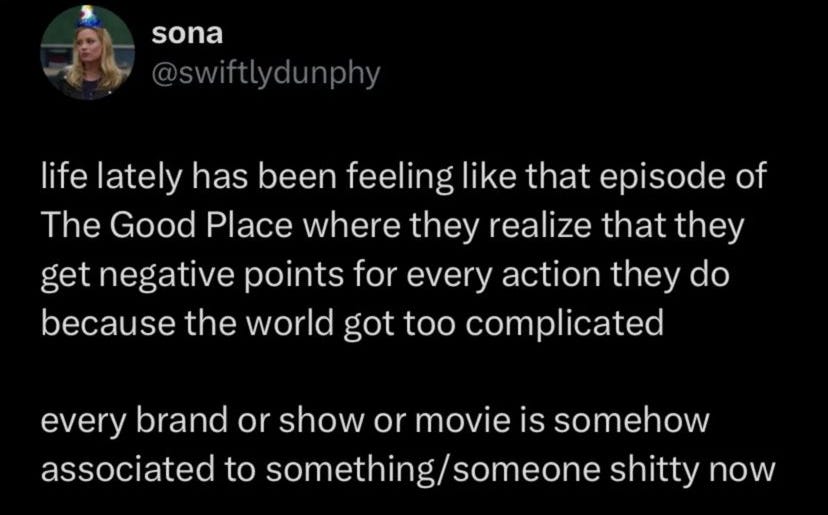
Our lazy brains have an instinctual aversion to “unease”, sort of like how we know from birth to avoid venomous creatures or brightly-coloured berries. We love nothing more than to shove unsavoury things into tiny, tiny boxes and then tuck them into the deepest recesses of our minds, never to revisit them—a defence mechanism so common that psychologists now call it compartmentalisation. In our outrage, we scramble to distinguish ourselves from those we hate by claiming to have some kind of moral high ground over them (another psychological term called rationalisation); if we are “good”, then they must be “bad”, their actions must be “evil”, their tastes must be “immoral”, and so on.14 For the purposes of this article, what you need to understand is that “unproblematic media” is an ideal that is inherently unattainable, that we aspire our media to be, and that we position pieces of media that we do not like against.
All of this is not to say that certain pieces of media do not depict sensitive subject matter poorly or that media cannot reflect its creator(s)’s questionable and/or bigoted viewpoints (I chose to not comment on the numerous Armie Hammer allegations for this very reason); however, those conversations deserve to be had with nuance and depth instead of being treated as black-and-white controversies. It is not enough, as consumers, to merely label a piece of media as “problematic” and pat ourselves on the back for it anymore—to rephrase Tumblr user @surelytomorrow, the only way for us to make a change to this world is to engage with it. Not to quote HBO’s Succession as my send-off, but as the great Kendall Roy once said:
“You’ve lost context.”
Returning to Call Me By Your Name, when I first set out to watch the film in August, I did not expect to love it as much as I did, let alone spend the next four months trying to wrangle together a cohesive article about it—I was always going to write this, but maybe not …this, if that makes any sense. This messy, heartfelt piece of media consumed my brain and ultimately changed my outlook on life, which is the impact that all great works of art should have on its enjoyers.

If you reached the end of the article, found yourself agreeing with most of the points, and have never consumed any piece of Call Me By Your Name media, I highly recommend watching the film adaptation—or, better yet, reading the absolutely phenomenal book by André Aciman—if only to apply these arguments to your everyday life15. Praxis, amirite? Additionally, there exists a sequel to the Call Me By Your Name book published in 2019 called Find Me, which I refuse to read (the last twenty-ish pages of the original novel are perfect as is) but have heard is good.
If you like Call Me By Your Name and are craving some gut-wrenching pieces of unrelated media to sink your teeth into this winter, you should read Giovanni’s Room by James Baldwin! Imagine Call Me By Your Name but set in 1950s Paris, told from an angstier Oliver’s perspective, and, despite all the characters being in their mid-twenties to early-thirties, centred on a queer relationship that is ten thousand times messier than anything teenage Elio could have ever envisioned. Whilst definitely not for the faint of heart, I would also be remiss not to mention Showtime’s limited television series Fellow Travellers, which spans four decades of queer American history—from the height of McCarthyism to the AIDS crisis—and single-handedly ruined my life this holiday season, on this list.
Though this changes virtually nothing since my upload schedule is already out of whack, the articles will have to be put on pause for the next semester; I had to jump through some truly bizarre censorship hoops in order to write a version of this article that I both liked and that the school administration would condone, so look forward to a video essay to be released sometime in May about that whole fiasco! I will try my best to put out that long-awaited essay about Succession and offices during my hiatus, but no promises.
See you all in the New Year!
Edmond, Maura. “Careful consumption and aspirational ethics in the media and Cultural Industries: Cancelling, quitting, screening, optimising.” Media, Culture & Society, vol. 45, no. 1, 7 June 2022, pp. 92–107, https://doi.org/10.1177/01634437221099615.
D. Clark, Meredith. “Drag them: A brief etymology of so-called ‘cancel culture.’” Communication and the Public, vol. 5, no. 3–4, 16 Oct. 2020, pp. 88–92, https://doi.org/10.1177/2057047320961562.
“Not knowing how to quit a particular creator or piece of media” is a reference to the “I wish I knew how to quit you” scene from queer cinematic masterpiece Brokeback Mountain (2006).
I took so long to write this article that now, I am legally required to mention Timothee Chalamet’s “recent” SNL sketch where he jokes about his band being named Hamas during the Palestinian Genocide among the list of crimes that the Call Me By Your Name lead actors have committed against humanity. Had this article been published when it was supposed to, he could have gone off scot-free!
If you are interested in a more fleshed-out examination of Call Me By Your Name’s depiction of predatory relationships (and the Armie Hammer allegations), the section called “Is the age gap problematic?” in Lola Sebastian’s Call Me By Your Name’s video essay is superb.
Hoek, Janet, et al. “From social accessory to societal disapproval: Smoking, social norms and tobacco endgames.” Tobacco Control, vol. 31, no. 2, Mar. 2022, pp. 358–364, https://doi.org/10.1136/tobaccocontrol-2021-056574.
Washington, Harriet A. “Burning love: Big tobacco takes aim at LGBT youths.” American Journal of Public Health, vol. 92, no. 7, 16 Apr. 2002, pp. 1086–1095, https://doi.org/10.2105/ajph.92.7.1086.
Macapagal, Kathryn, et al. “Hookup app use, sexual behavior, and sexual health among adolescent men who have sex with men in the United States.” Journal of Adolescent Health, vol. 62, no. 6, June 2018, pp. 708–715, https://doi.org/10.1016/j.jadohealth.2018.01.001.
Analysis by u/GeishaDeRhin from “What’s the meaning of the lycris in Visions of Gideon” in r/Sufjan, published on 29 December, 2017.
Aciman, A. (2007). Call Me By Your Name.
Maurice, originally written in 1913–1914, is best-known for being one of the first pieces of queer literature that features a happy ending for its romantic heroes, Maurice Hall and Alec Shudder. Though I have my qualms with the 1987 film adaptation by James Ivory—who just so happens to have won the Academy Award for Best Adapted Screenplay for Call Me By Your Name—young Hugh Grant’s sympathetic portrayal of closeted bastard Clive Durham makes the viewing experience worthwhile.
Forster, E. M., & Furbank, P. N. (2005). Maurice. Penguin.
Concepts recontextualised from ContraPoints’s “Envy”—I would love to be able to claim that I actually read Nietzsche for this article, but no.
Armie Hammer voices the audiobook, though, so make of that what you will.






